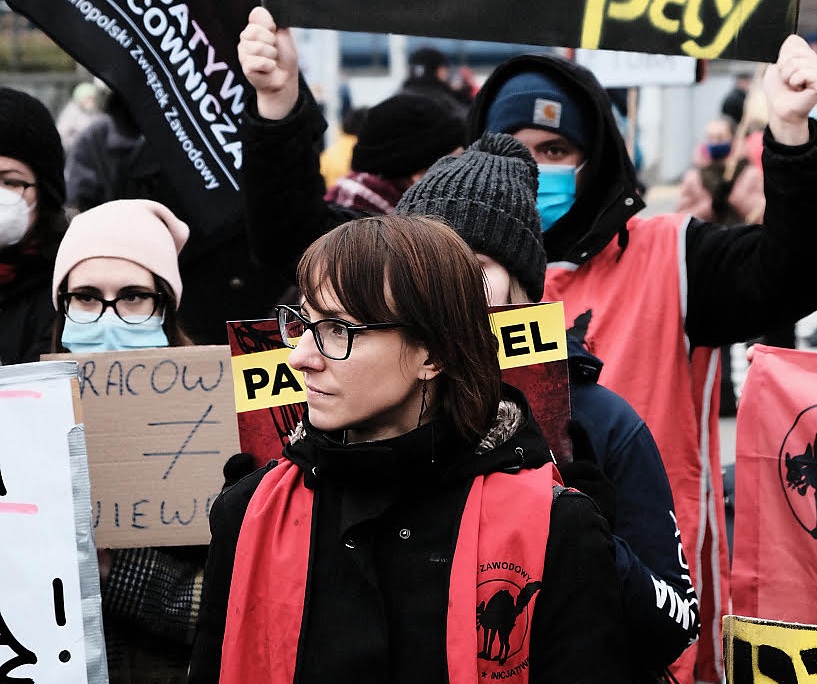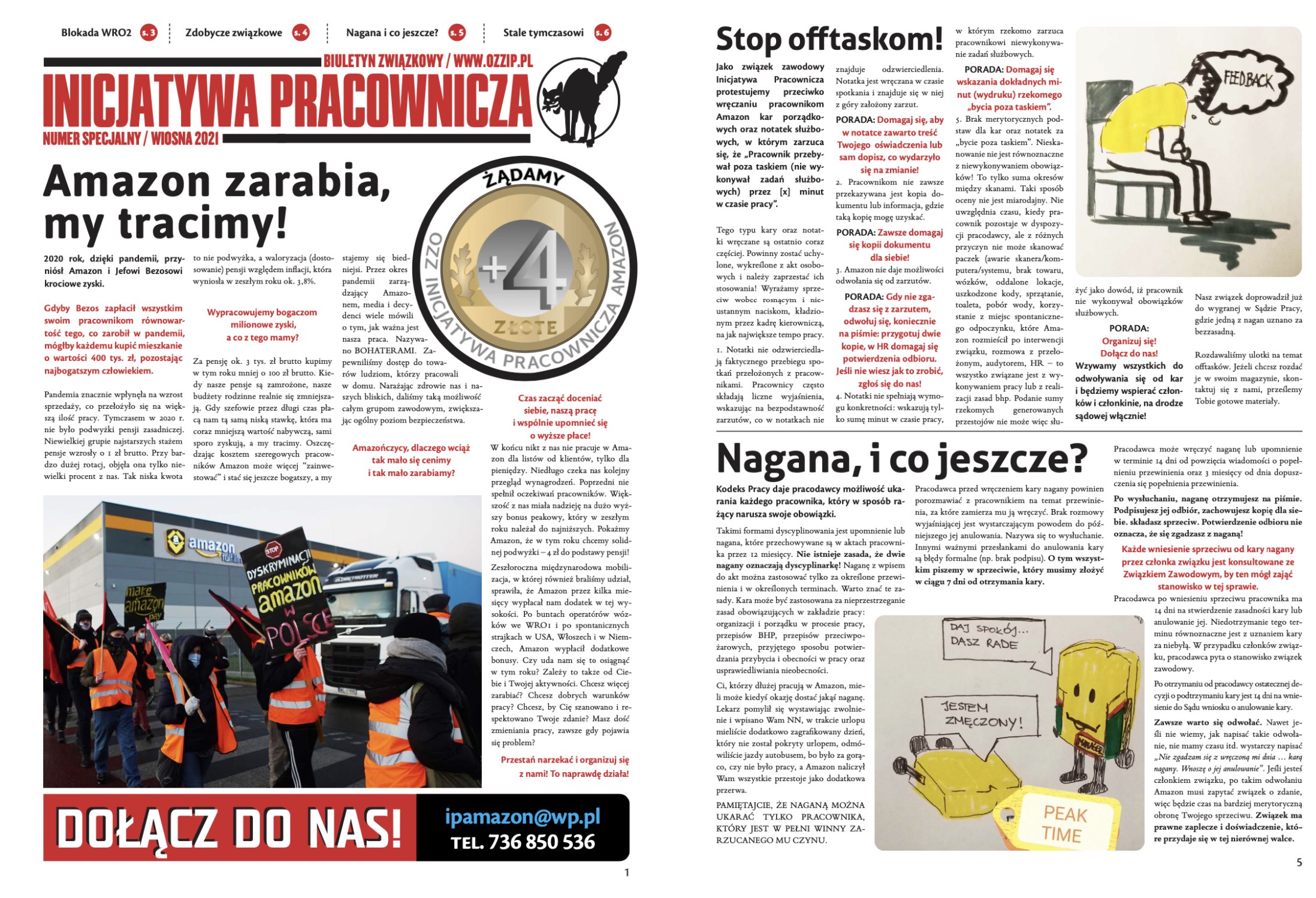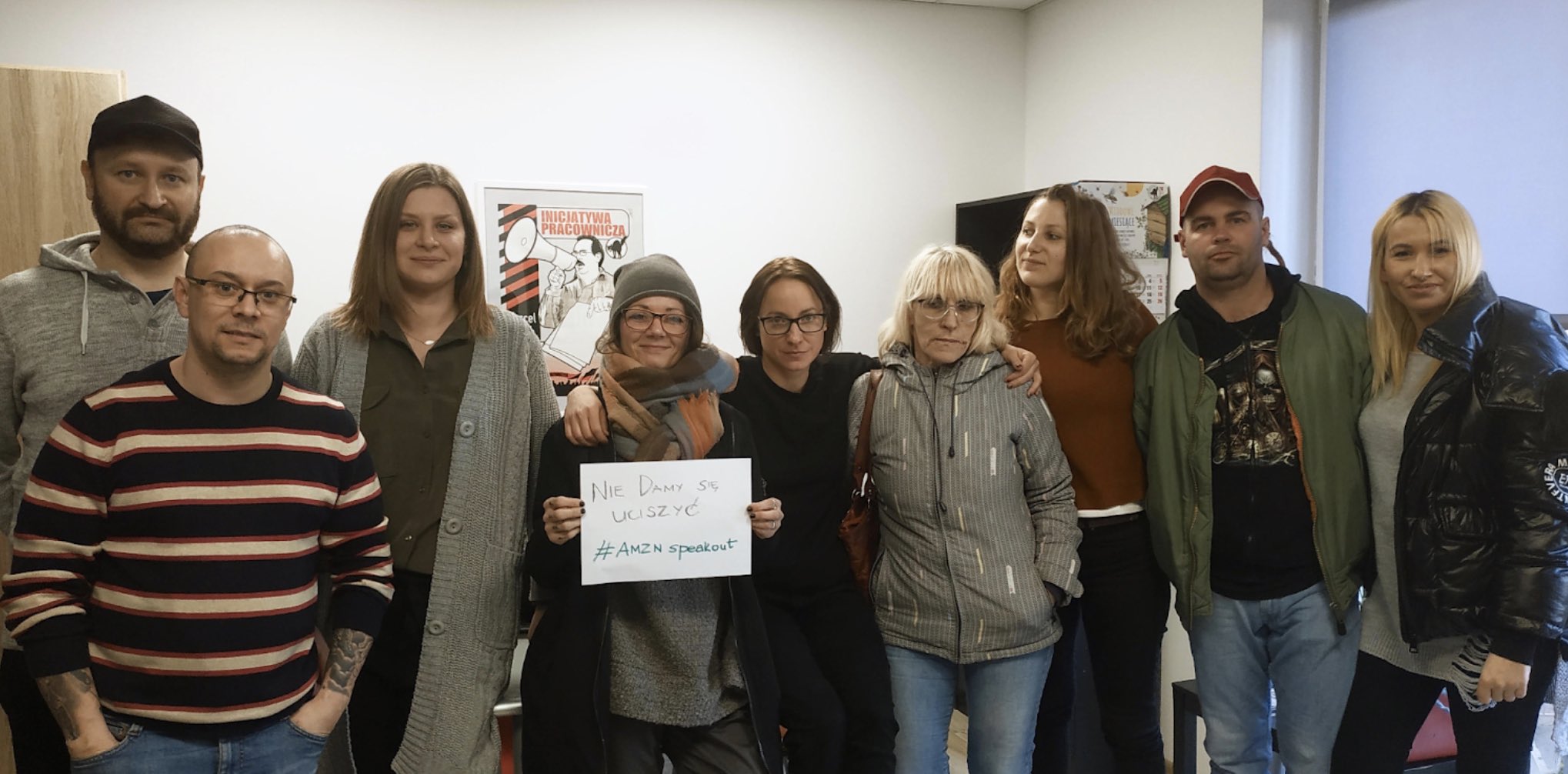Lessons from Poland: Amazon is international, but so are we
28 Dec 2021
Dear readers, death comes fast and slow at Amazon warehouses. Workers suffered a tornado in Illinois, COVID worldwide, and holiday season production exhaustion. Today, Polish warehouse worker Magda Malinowska talks about shop floor organizing and how Amazon failing to properly measure “energy expenditure” led to the fatal overwork of her coworker Darek. But while her union organizes to improve conditions, Amazon avoids accountability by escalating its anti-union campaign. As Amazon expands internationally, shop floor organizing requires international solidarity, too. In light of Magda’s recent firing, we decided to close this year by creating a fundraiser to support Magda’s organizing with her union – donate here.

Magda and fellow Amazon workers and Inicjatywa Pracownicza union members
The Worker’s Perspective
By Magda Malinowska
According to Amazon’s logic, I must be a magician.
On September 6, 2021, the company claims I was hiding in my car outside the Poznań warehouse where I had been working for 6 years – and at the very same moment, it claims I was also inside the warehouse photographing the corpse of a coworker who had just died on the job. This was the story Amazon gave when it fired me in November, two months after the death of Darek, my coworker and my friend.
The truth is closer to the more mundane horrors of work at Amazon. For a while Darek had complained about excess physical demands at his workstation and was denied his request for support. That day, he collapsed. And instead of calling for paramedics, management said they couldn’t let paramedics in because of covid – despite the fact that there were thousands of people in the warehouse. So Darek was forced to go downstairs and get to the paramedic’s office on his own. He made it, but after making such a huge effort, he died on the spot.
As a union rep and health and safety inspector, I went to Amazon’s HR and tried to convince them to put me on the post-accident team to investigate what happened. They denied my request. So I went out to call our lawyer. Just then, they closed the doors to all workers, and HR and security were outside transporting the corpse of my friend into a funeral van. I just sat in my car surrounded by the crowd. Then, two months later, Amazon came out with the magician story and fired me. Mind you that, as per Polish law, Amazon had one month from the alleged incident to dismiss me for disciplinary reasons. Moreover, workers with union positions like myself have legal protections. So I sued to get reinstated, but it will take three years if I’m lucky, five years if not.
Workers at Amazon are dying quick and slow deaths. The company is trying to break any organization we build to fight for our health and our lives. Here’s the story of our struggle, and how I ended up in it — perhaps someday you will find yourself in a similar struggle.
Encountering Logistics
I graduated from university in 2010, but as a philosophy graduate, I couldn’t find work so easily. I was doing odd jobs and seasonal jobs abroad for a few years.
By then I also was making films and doing journalistic work with the grassroots union Inicjatywa Pracownicza (IP), or Workers’ Initiative in English. In 2013, we made a report about special economic zones in Poland and I did a tour around Italy meeting logistics workers – fantastic people. I was in meetings with hundreds of workers who were struggling against the exploitative cooperative system, with temporary contracts, unstable jobs, and poor wages. We realized that the logistics sector is growing the same way in Poland! After the trip to Italy, I got a warehouse job in England to earn some money to live. I went with my comrade Kris from IP and together with friends from Angry Workers of the World, we started to organize ourselves as temp workers. We worked in an area that processed 60% of the food consumed in London. Mainly migrants work there. My family lived nearby. We started to organize and did a slowdown. I worked there for almost a year, and when I lost the job, I came back to Poland.
It was 2014 and Amazon had arrived in Poland. My plan was to work for just a few months to get insurance. I worked well and was fast. After a few months, I got converted from a temp agency contract to an Amazon contract, and then a permanent contract — the first in my life. And then I became an official union rep with IP.
The Struggle in Amazon’s Polish Warehouses
Amazon workers are everyone. Younger workers in their first job, older workers with many different past jobs, migrants from all over. The warehouse I worked in had people from maybe 30 different villages. It’s difficult to find one single message.
But something we often hear, especially among younger workers, is that they don’t deserve better than Amazon or better working conditions. They’re still influenced by the American dream from the 90s, that you have to make all the changes yourself to get a better job, and if you can’t, don’t complain. It is a common belief in Poland that working people are failures. As a result, employees do not believe in each other. They do not believe that we can act together and achieve something together, that when I stop working, others will follow me.
Of course, there are exceptions – and successful actions. We organized many high-profile protests, such as last year’s blockade of trucks entering Amazon in Wrocław, which we did with the international campaign Make Amazon Pay. Trucks waited several hours for entry: we had blocked all access to the warehouse and the nearby highway. Amazon suspended some work in the warehouse. Workers liked it.
But the most important thing is to engage the workforce directly. We have held a strike referendum twice now at Amazon in Poland. In both cases, 5,000 workers participated – 30% of Amazon’s entire workforce in Poland! – and nearly all of them voted in favor of holding a strike. We were proud of the result. It’s so difficult to organize such a thing in such a huge and dispersed company. Unfortunately, we did not meet the 50% participation threshold required by Polish labor law. Amazon workers could go on strike in any other country in Europe, but not in Poland.
Beyond the lack of mass solidarity, there is also an issue with union legitimacy: some people from the 90s who saw unions betray them, so they don’t trust unions. A large proportion work for temp agencies, so joining a union is less useful. And permanent workers doubt they’ll get support from temp workers if, for example, they do a slowdown. So we try to bring together temp and permanent workers. We try to convince them we’re on the same team. Our first strike vote had hundreds of temps showing up to sign attendance lists with their names and addresses — they weren’t scared.
Then there is the Christmas peak season – the warehouses are not prepared for such a huge influx of new workers. They’re overworked and have many accidents. Amazon pushes workers to hit new records of sent parcels. So we talk with people about the fact they don’t have to break health and safety rules for targets, work when sick, and so on. We also distribute newspapers with tips and info for workers, and in case anything happens, they can get in touch with us.

A couple pages from a 2021 issue of IP's newspaper. The headline reads, 'Amazon makes money, we lose!'
Indeed, we have been tackling health and safety problems for some time. Three years ago, we convinced Poland’s National Labor Inspection to measure workers’ “energy expenditure” – calories burned during a shift. The results of the research by the Labor Inspection were terrifying. Some women expended two to three times more energy than the legal limit. In simple words, they slowly kill themselves at work.
With Darek’s death, our union accused Amazon of being liable since they failed to measure the energy expenditure. Even when Darek complained about doing the work of three people, he got no support. And Amazon knows the reports prepared by the Labor Inspection. They should automatically measure all jobs in the warehouse in the proper way and change working conditions accordingly. They did none of that.
Amazon is Growing, but so is Our Organizing
In 2014, when Amazon opened in Poland, things were different. We thought they’d close warehouses next door in Germany and rely on our cheap labor to serve the German market. But Amazon doesn’t close; they just kept expanding. We earn three times less than German workers, so we work overtime to survive. And whenever workers strike in Germany, Amazon asks us to work even more to fulfill the orders rerouted to Poland. This makes it hard to discuss the idea of working less. Our friends from Germany wanted to make a statement that wages in Poland and Germany should be the same, to strengthen both Polish and German worker power. We still haven’t done it because of pushback within the bureaucracy of their union, Verdi. But no matter what, we respect and like our friends from Germany. Our cooperation is very strong. I got so much support from them and from Verdi when I was fired. Thanks to that, instead of being depressed, I got new energy for organizing.
At the beginning, Amazon didn’t want to push us too much. We felt strong for a few years. We won demands around wages, around health and safety. We have more workers in the union and in efforts around the world. But at the same time, Amazon is more aggressive and unafraid. They are ready to break the law to get rid of unionists and squeeze workers. Turnover is very high. I sometimes feel that every year we have to start from scratch with new people, to mobilize them, explain things, and show that we’re here.
The pandemic gave us focus. In the early months, we cooperated with European and US workers in warehouses and in corporate offices. We made common demands – and Amazon met many of them. We got hazard pay, health and safety improvements, and more. We made demands on an international level. It was quite difficult, sharing information day after day on Zoom calls, sometimes at 2am to connect with people in the US. The pandemic was difficult, but it helped us strengthen cooperation and accomplish a lot. To build on that, we need to expand our efforts and push our demands. And we need support: journalists investigating situations, academics analyzing experiences, politicians changing laws. And we need workers in both warehouses and corporate offices linking it all together in a body that’s able to face Amazon — from groups in headquarters like Amazon Employees for Climate Justice to transnational networks like Amazon Workers International, which we formed in Europe and have made efforts to extend to the US and beyond.
Amazon is not just an e-commerce company. They dictate labor market standards and lobby against labor protections. When we stop organizing for a while or give up, they take back what we won. If we want to live decent lives or at least keep what we have now, we don’t have a choice. We have to keep fighting and moving forward. It’s better to be in this together.

Magda and Inicjatywa Pracownicza union members standing along with fellow Amazon workers throughout Europe against the company’s 2020 retaliation of corporate office workers organizing with Amazon Employees for Climate Justice.
Thank you to Nantina V, Danny S, and Tamara K for helping pull the story together. I highly recommend workers talk with them – and one another! To learn about our international efforts, visit the links above. And donate to support IP’s union organizing via GoFundMe here.